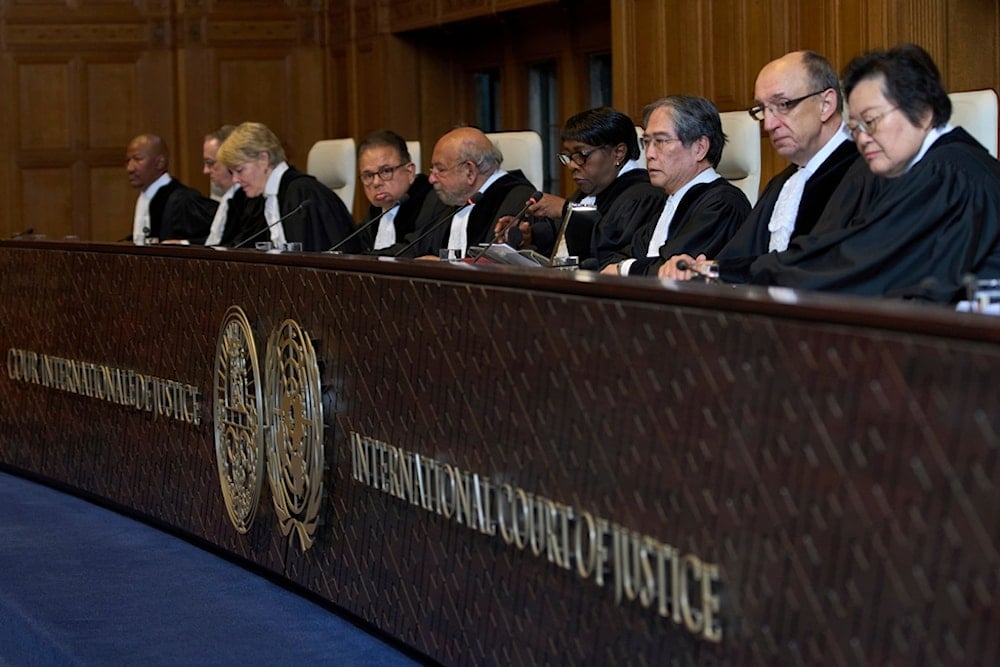ICJ to rule on Sudan’s genocide case against UAE over RSF support
Sudan accuses the UAE of complicity in genocide at the ICJ while Scotland Yard investigates alleged war crimes by the RSF, as international calls for accountability grow.
-

Presiding judge Yuji Iwasawa, third right, opens the International Court of Justice hearings into a United Nations request for an advisory opinion on "Israel's" obligations to allow humanitarian assistance in Gaza and the West Bank, in The Hague, Netherlands, Monday, April 28, 2025. (AP)
The International Court of Justice (ICJ) will rule on Monday in a case brought by Sudan against the United Arab Emirates, in which Khartoum accuses the Gulf state of aiding genocide through alleged military support to the paramilitary Rapid Support Forces (RSF).
Sudan’s legal team has argued that the UAE’s arms shipments to the RSF are fueling atrocities, including mass killings, rape, forced displacement, and looting, across Darfur and beyond. The hearing at the UN’s top court in The Hague marks a major escalation in the international legal battle over the year-long conflict.
UAE arms to RSF at core of genocide allegations
Since April 2023, Sudan has been engulfed in a brutal power struggle between army chief Abdel Fattah al-Burhan and RSF commander Mohamed Hamdan Daglo. Khartoum claims that UAE arms to RSF have enabled what it calls a genocide in progress, especially in the North Darfur region, where the UN recently reported over 500 civilian deaths in just three weeks.
Muawia Osman, Sudan’s acting justice minister, told the ICJ last month that “the ongoing genocide would not be possible without UAE complicity, including the shipment of arms to the RSF.” Sudan is demanding that the court order the UAE to cease all alleged support and pay full reparations to the victims.
UAE dismisses claims, challenges court jurisdiction
The UAE has firmly rejected Sudan’s allegations, with Foreign Ministry official Reem Ketait labeling them “at best misleading and at worst pure fabrications.” Ketait described the case as political theatre aimed at damaging Abu Dhabi’s reputation.
Legal experts warn that Sudan’s case may stumble over jurisdictional hurdles, as the UAE’s 2005 accession to the Genocide Convention included a reservation to the article that allows countries to bring disputes before the ICJ.
“There is clearly no basis for the court’s jurisdiction in this case,” Ketait told the judges, calling for the case to be removed.
The court’s ruling, expected Monday, could set a significant legal precedent in how states are held accountable for complicity in international crimes. However, the ICJ lacks enforcement powers. Its rulings are binding, but compliance depends on political will, illustrated by cases where entities like Russia and "Israel" ignored ICJ decisions.
The Sudanese conflict has already led to what aid agencies describe as the world’s worst displacement and hunger crisis. According to UN-backed assessments, famine has taken hold in at least five areas of the country.
The conflict has also led to the killing of over 150,000 people and forced more than 12 million to flee their homes.
RSF war crimes under scrutiny by UK authorities
In a related context, Scotland Yard has received a comprehensive war crimes dossier detailing alleged atrocities committed by the RSF during the ongoing conflict in Sudan, The Guardian.
The submission, made to the Metropolitan Police’s SO15 counter-terrorism command, highlights a wide range of crimes, including mass killings, torture, and sexual violence, contributing to growing calls for accountability over RSF war crimes in Sudan.
The 142-page document was compiled by a London-based legal team specializing in international law. It aims to support global efforts to prosecute war crimes and specifically urges SO15 to review the evidence and forward it to the International Criminal Court (ICC) as part of its ongoing RSF investigation in Darfur.
Read more: Sudan war escalates as RSF vows painful strikes, targets Port Sudan
Darfur atrocities and case for 'command responsibility'
The legal team argues that the RSF leadership bears responsibility under the doctrine of command responsibility, asserting that commanders either knew or should have known about the crimes committed by their forces.
The atrocities documented focus heavily on Darfur, where civilians, especially from the non-Arab Masalit community, have been targeted in what rights groups and diplomats have described as ethnically driven violence.
Sir Howard Morrison, a former international judge, called the evidence “compelling” and described the approach through SO15 as a significant step in supporting future prosecutions.
Lead lawyer Lucia Brieskova emphasized that the submission is intended to aid in ending the cycle of impunity, saying, “We believe this submission will contribute to the fight against impunity suffered by many in Darfur in Sudan.”
Evidence builds as atrocities expand beyond Darfur
The case was submitted on behalf of a Sudanese pro-democracy supporter, whose identity is being withheld for security reasons.
The Scotland Yard war crimes investigation dossier draws on material from UN reports, human rights organizations, and media documentation.
“Taken together, this direct and circumstantial evidence makes it clear that the RSF leadership either knew, or at least should have known, that the war crimes were being committed by the RSF in Darfur,” the report states.
While international attention has focused on Darfur, reports of atrocities by the RSF are emerging from other regions of Sudan as well. Last week, video footage showed at least 31 civilians, including children, killed in Omdurman, across the river from Khartoum.
The Sudanese army has also been accused of crimes against civilians. Several of its commanders are under US sanctions for their roles in the conflict.
Read more: Sudan paramilitaries launch first attack on de facto capital: Army

 5 Min Read
5 Min Read








